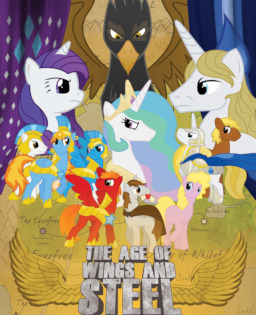
Afterword
If you'd told me two years ago that I'd soon be writing a novel, I'd have said "Neat!" but I certainly wouldn't have imagined it might be about a bunch of talking, technicolor horses. But then, I found ponies; and with ponies, the urge to write. One night I typed up a short fic about Luna's imprisonment on the moon (it's buried in the EQD archives, but please don't read it, it's terrible), and that got me in the mood to do some more storytelling. I wasn't sure what to write about, though, because there was still only one season of the show at the time and slice-of-life didn't interest me as much as grand adventure.
The seed of the idea behind Wings was planted by a thread on some imageboard or another talking about pony genetics. There was a unicorn/pegasus Punnett square where unicorn and pegasus genes were treated as recessive traits, which got me wondering. What would happen if a pony ended up with both and no overriding earth pony genes?
The obvious answer is, of course, that they'd be an alicorn, with both magic and flight. But then I gave the matter some more thought, and decided instead to treat it like hemophilia or some other hereditary disease. They'd be born with near-vestigial wings and a horn, with all the marks of power but none of the requisite grace or ability. Now I had a basic conflict, but not enough to create a story.
One of my favorite concepts is the reconstruction of a downright terrible idea into something presentable. I'm a strong believer that there are no bad ideas, just bad writing. Anything, if written well, can be turned into an entertaining story. I had never heard of the Codex Alera series before writing Wings, but once a commenter introduced me to it, I learned that it was created much the same way: take a pot full of awful, overused cliches, combine them together, and make something good out of it. At first, I viewed it as a fun writing challenge. I started thinking more about the character I'd be creating, building a small plot structure, but nothing solid.
It wasn't until the first September Pony Novel Writing Month was announced that I realized I really wanted to tell this story. I had finally settled on the elements I would be reconstructing: Alicorn OCs, ponies at war (especially with griffons), and the subtle distinction between dark and grimdark. There are countless examples of nameless, terrible fics involving one or more of these ideas, so I wanted to make an effort to save the ideas themselves from the trash heap.
War stories were probably the least dire of the three, as there are several out there that are already well-liked (for instance, The Immortal Game), but I knew from the start that I didn't want the focus to be on the battles or the fight scenes. For one thing, they're not all that fun to write; there's only so many ways you can say "one guy killed another guy" before it starts getting dull. For another, I wanted to focuse on the war's effects on the characters fighting in it. The downfall of many war stories is a descent into maudlin despair and a lot of navel-gazing on the nature of war.
I tried to avoid this by instead focusing tightly on the fears and concerns of the individual soldiers. Are their loved ones still alive? Are they fighting for the right reasons? Will they survive the next battle? I don't care much for waxing philosophical on the nature of humanity (or equinity, I suppose) in the text. I much prefer to let the reader draw their own meaning from the story, as I'll discuss later on. Additionally, it's important to me to portray soldiers in my stories as real humans (or ponies). I'm not in the military myself, nor do I expect I ever will be, but I have a large number of family members who are. I've got nothing but respect for them, and I feel I owe it to them to try showing that soldiers aren't mindless automatons or drones, but real people with real fears and hopes and dreams. That's something I feel a lot of war fics lack.
Grimdark is probably best exemplified by the infamous Cupcakes. Gore for the sake of gore is just there to shock the reader, and serves little purpose in a text medium. It can certainly be amusing to watch chumps in cheesy horror movies get murdered in Rube Goldbergesque ways, but on the page it tends to simply be sickening or repulsive, or worse, tedious. I already had a war on, so the source of my darkness was easy to find. I left most of it implied until the very last few chapters, especially the rather uncomfortable scene with Inkpot and the griffons.
The distinction between dark and grimdark is hope. In grimdark, the world sucks, and there's no chance for the situation to improve. It's almost impossible to care if there's no hope. This was the problem I had with the Battlestar Galactica reboot. After the fourth major character got shot and played up as dead, I just couldn't summon the will to care about them anymore. So I set out to ensure that for all the loss and sadness, there was always a ray of hope to be found: Inkpot's terrible experiences don't change her forever. She moves on, as do Windstreak, Celestia, and Emmet. I've been through personal tragedy before, and the most important lesson I learned from it is that eventually, those wounds heal. Whether it be the loss of your home, or the death of a loved one decades before their time, that hurt gradually becomes a part of your past and life goes on.
My main goal with Rye was to subvert the alicorn OC in its entirety. I broke down the stereotypical alicorn into several parts to figure out why exactly they're so loathed. I found that it was not the wings and the horn themselves—otherwise, Luna and Celestia would be universally reviled. Instead, alicorns are hated for many of the same nebulous reasons the infamous Mary Sue is. It's interesting to note that one doesn't necessarily mean the other; a Mary Sue is not defined by their powers, their specialness, or their overly excessive physical description, but rather by the vortex-like effect they have on the story. They suck all attention to themselves like a Hoover. Not a black hole, though. I'm an astronomy major (hence the loving descriptions of the sun), I'm rather sensitive about that.
Still, those elements do play a role in signifiying a terrible character; one who exists for no purpose other than to give the rest of the characters someone to talk about. So I decided to deliberately subvert as many of these as I could. Rye's physical description is a paragraph long, as are most characters', and is quickly gotten out of the way. The cool clothes he gets are almost a joke; he has to wear mare's mail because he's too small for the stallion-fit armor. Rather than have every character in the story love OR hate him, most don't know about him at all—the main antagonist never even learns of his existence. That, more than anything, was what I used to separate him from the stereotypical alicorn character.
The second major hate-magnet for main characters of any stripe, alicorn or no, is an excess of angst. Especially when it's unwarranted or forced, like the omnipresent dead little sister or parents. So Rye doesn't have dead or abusive parents to cry over, they're still around, and they care quite deeply about each other. His mother's a little controlling, and a good deal of his character arc is growing out of her shadow and deciding what he wants for himself, but he doesn't reject her goals and hopes for him out of angry rebellion. Instead, it's just him growing up a little.
But parents aren't the only source of angst for heroes, their flaws are typically lightning rods for the protagonists to whine about. So I decided that, instead of focusing on Rye's disabilities, I'd simply move them into the background. I describe his mental state to myself as 'post-angst'. He was certainly broken up about it in his youth, but thanks to Cranberry's influence he moved past it and devoted all his energy into making his flaws not matter. It's an extremely liberating trait to write with, because it allows me to turn his attention and effort outward rather than inward. Instead of imploding from the gravitational pull of his own issues (and he has many), he goes out into the world and tries to overcome them. This is definitely a trait borrowed in part from a character I'll discuss later on, and it's one I love to use—both Cranberry and Inger have similar statuses.
The most obvious subversion of the typical alicorn character is actually the least important, in my view. Rye's inability to fly or do magic provide some nice regrets for him, but they aren't really what his character is about. At the time of the story, he's disappointed in his limitations, but not angry. They're just something he's got to live with. What does make him angry is anti-pegacorn sentiment, but I almost left that somewhat unexplored on purpose. I'm sure readers can fill in the blanks on just why pegacorns are so disliked (hint: the same reason alicorn OCs are disliked!) but I felt it more interesting to simply turn it into another, omnipresent obstacle for the hero to overcome.
The lack of magic served another purpose, too. Astute readers might have noticed that I avoid powerful unicorn characters whenever possible. The Sleipnord group has no powerful magic users in their number, not counting the forest incident, and Windstreak's storyline is entirely devoid of named battlemages. Even my major unicorn characters, Celerity and Clement, rarely use magic. I find magic to be a double-edged sword in fantasy. If the focus of the tale isn't on magic, then it tends to become that nagging detail prodding the reader every time it comes up—why don't the heroes simply use magic to solve their problems? If the story IS focused on magic, it becomes easier to create challenges that nullify that complaint, but Wings was never intended to be such. I found it simpler to simply shove magic into the background than to have powerful healers walking around fixing all the heroes' wounds and nuking the griffon armies.
The one exception is, of course, Celestia. But her magic is never portrayed as a good thing. The sun's power is extraordinarily destructive, and in the end accomplishes nothing good for her cause. As for those readers curious about why she can't simply fix most of the cast's problems at the end, it's because I've written her as more of an elemental god than a Greek or Abrahamic one. She has tremendous destructive potential, but not much ability to create. You may have picked up on the subtle clues that the gods did not create the mortal races in this story. In fact, with their enormous power, they oppressed them more than anything else, breaking the natural order the dragons had instituted and shattering the earth. Read what you will from that.
I drew from many influences to create the story, including the almost obligatory Lord of the Rings three-act structure, with the battles of Whitewall and Canterlot standing in for Helm's Deep and Minas Tirith. I did try to make them distinctive with the inclusion of the dragons, as well as the increased focus on the dread and preparation for the battle that are missing from the LOTR setpieces. Return of the King has some of it, with the chapter where Pippin runs around Gondor, but on the whole there isn't really much buildup, and the battles themselves are over in a few scant pages. I share Tolkien's desire not to focus over-much on the battles, as that's something that works better in a visual medium (and of course, I'm sure his experiences in World War One had much to do with it), but I do feel they need to be shown to drive home the cost of war and the utter in-your-face brutality of medieval conflict.
However, the source that will be immediately apparent to anyone who's read the works of Lois McMaster Bujold is the Miles Vorkosigan series. In fact, the first chapter is lifted almost entirely from The Warrior's Apprentice, much to my chagrin. The story soon diverges after that, however, turning not into a comedy-of-errors but a straight war drama.
In the Vorkosigan books, the main character is the son of an imperial regent, the hero of his home planet's last two wars. Windstreak is definitely based on Aral Vorkosigan, but she grew away from him as time went on and became her own character, a development with which I was pleasantly surprised. Miles, Aral's son, is crippled during an attack on his father's life, and left with brittle bones and a stunted skeleton. In his planet's military-mad society, he struggles with all his might to prove that he can be as great as his father without relying on nepotism.
Rye was, of course, based on Miles (in fact, his name in the original draft was Riley, though I later changed it to be more pony-like), but he was never intended to be Miles in pony form. I don't have enough faith in myself to even attempt writing such a glorious lunatic, so instead I decided to make Rye a more grounded, reserved character. He does still show traces of his origins at times, especially in scenes like the thanesmoot, but for the most part he turned out different enough that I hope I can claim him as my own.
Cranberry is a composite of several characters from a rather disparate array of sources. She has elements of Elena, another Bujold character, mainly her relationship with Rye. She also has some of the bluster and short temper of Refia, from the Final Fantasy III remake for the DS. The group dynamic between the three main characters was originally grounded in the main party from that game, as well. Cranberry also has a little Hermione in her, mainly her insufferable insistence on throwing knowledge at people whether they want it or not. However her most defining characteristic, in my eyes, is her enthusiasm for everything, which made her a joy to write. The world seen through Cranberry's eyes is a bright, vibrant place, and for all her viewpoint chapters I tried to capture that.
Her other defining characteristic, her love of history, is actually me making the best of a bad situation. As I hammered out the first draft of the story, originally only intended to be some sixty-thousand words, I began to realize that poor Cranberry the librarian was being forced to shoulder almost all the burden of exposition. After writing out the third or fourth infodump on Sleipnordic culture, I realized she was becoming a tedious character who acted as little more than a narrative device. I could either throw out most of her exposition and try to work it in somehow else, or I could go to the other extreme and make her entire character about said exposition. I decided on the latter, which eventually led to her hyperactive puppy-dog enthusiasm about foreign cultures.
I very much like the dynamic of the childhood friend. They're someone who knows you well enough to tell you straight up when you're being an idiot, while still wanting nothing but the best for you. This role could be filled by a sister or a brother, but instead I left it as an unstated plot point that Windstreak and Apricot never had another child after Rye. Again, take from that what you will. The fate of Cranberry's parents was another attempt to use the 'post-angst' concept. Despite the awful trauma of losing her parents at such a young age, she still had enough of a supportive family structure to become the character she is by the time the story starts. In fact, she's the cheeriest person in the entire book.
Inger was a rather flat character in the beginning. The rough, gruff royal guard was stuck acting as the straight man to Cranberry and Rye, handling all the combat, acting grumpy, and doing little else. As the story evolved, Rye ended up taking up Inger's role as Cranberry's foil, and Inger was allowed to grow into his own. He eventually became the familiar best-buddy character for Rye, lending dry humor and a much-needed military sensibility to the duo of inexperienced civilians. On the subject of his name, it actually came from another FF3 character, a royal guard named Ingus who joins the party early on. I later found out that Inger is actually a real Norweigian name, much to my surprise, and kept it in.
Actually, the names were intended to be another subtle worldbuilding element. I'm sure many have wondered why there are ponies named Cranberry and Strawbuck talking to Tymeos and Celeritys. I split the names into two groups. The commoners have simple noun- and adjective-based names, like Rye, Cranberry, Inkpot, Apricot, and Plumline. The nobles, and those of noble birth, have more exotic names like Fritz, Jauffre, Dalamant, Emmet, and Clement. Inger is clearly not a commoner name, another hint that his father was likely a noble who abandoned his mother when she became pregnant. I'm still debating whether or not to explore that issue more in any potential sequels.
So now I had my core cast, but I still needed a world for them to inhabit and a quest for them to go on. The quest was simple enough to come up with, since I already knew the story's plot was going to be driven by a griffon invasion. I decided to structure my overarching plot impetus like Dragon Age: Origins', though I later discovered I was actually basing it on A Song of Ice and Fire. I wasn't introduced to that series until about six months after I began working on Wings, but I immediately realized that all the story elements I'd borrowed from DAO had been borrowed in turn from ASOIAF; namely the nobles, bickering while a threat from outside the kingdom creeps into their homeland, ready to destroy everything.
The nobles themselves were going to drive the conflict for the first act of the story. I already had plans for Blueblood's son, though he didn't have a name yet, so I knew one of my obstructive fools was going to be him. On the show, Prince Blueblood's obvious antagonist is Rarity, so I decided their ancestors were going to hate each other too. Celerity Belle (and that Rarity's last name is Belle is the one bit of headcanon I will defend to the death) was not based on anyone in particular, except perhaps an abstract Margaret Thatcher-esque "safety before freedom" type of leader. One interesting thing about Celerity is that she thinks she is the main character of the story. Unfortunately for her, she's wrong.
Celerity's tale is structured like a classical tragedy. Her fatal flaw is the ever-present Pride, a fact she actually remarks on at one point. Like several characters in the story, she starts down her path for all the right reasons, but by the end has so lost her way that her cause is difficult to support wholeheartedly. Celerity serves almost as a proto-Windstreak, forshadowing her descent into darkness. She, too, realizes her mistake at the end, but unlike Windstreak, she's unable to repent and turn away before it's too late. Shrikefeather is almost incidental in her fall—she brought it on herself through her refusal to compromise. And yet, without her swift action (and yes, her name is intended to be symbolic), Equestria wouldn't have stood a chance. So, was she right in the end?
Shrikefeather himself was a fascinating character to write. I wanted to convey a villain who was smart, pragmatic, had identifiable and justifiable goals, and yet remained a complete and utter monster. My rule of thumb when writing his scenes was that no matter what his motivations, no matter what overarching drive he had to help his nation, at the heart of the matter he's a warrior because he loves the thrill of killing his enemies. He's not excessively cruel, but he's utterly ruthless. His main emotion throughout the story is cold, a singleminded focus that drives the plot relentlessly forward. But I strived to present him in a way that readers could find him sympathetic if they so chose. I don't like to pass moral judgements on my characters, simply to present them as they are. I personally find him completely reprehensible, but it's easy to understand why he's the way he is if you look at his focus chapters.
One thing I regret is how the griffon society as a whole comes across in the story. It's a sad fact that the griffons found themselves stuck in the role of antagonist throughout the entire plot, and the only griffon characters I showed were the main villains. I would have dearly loved to show some rank-and-file griffons conducting themselves in respectable fashion, but I never found a way to do so without shattering the pacing of the story. Perhaps in a future fic.
Other cultures recieved only brief mentions, but Sleipnord was shown on at least a cursory level. The country's name is a fairly transparent reference to the many-legged horse, Sleipnir, and the Norse people of ancient Scandinavia. I didn't delve into the Nordpony culture as much as I originally intended to, because the quest for the hammer ended up overshadowing the majority of their screentime. Luckily, there's a vast library of tropes and cliches that have grown up around the Norse culture they're based on, so I could show just enough to let readers fill in the blanks themselves.
Contrary to what many have suggested, I never based any part of the Nordponies on anything from Skyrim or the Elder Scrolls series at large. In fact, Whitewall City was originally named Whiterun, and when Skyrim was released I promptly renamed it to avoid the association. The one thing I'll admit stealing was the name of the province of Breton, but only because I thought the name sounded good.
In fact, most of the nordic influence comes from an RTS game, Age of Mythology. The battle that Rye, Cranberry, and Inger run across is based on one of my favorite levels from that game's Norse campaign, where three clans are at war with each other. Those same clans were the seeds of Saddlestead, Aenir, and Hoofnjord. Many of the Nordpony words are based on the unit selection dialogues, especially Eberhardt's "Volsijeh!" which I believe can be attributed to Arkantos, a character in the game. The language itself I freely admit to making up as I went. I had no intention to construct an actual grammar system and new vocabulary, so I made up a single simple grammar variation (the pluralar) and a short list of words to use, then simply translated them from English. Luckily, I was able to justify this in-universe, by the reasonable fact that both Sleipnordic and Equestrian are descended from the old unicorn tongue, similarly to latin. Although, amusingly, both Swedish and English are actually more Germanic than Romantic.
One element of Nordpony society I intended to explore but didn't was gender inequality. It's pretty much nonexistent in the Equestrian chapters, and for good reason. If the ponies' physical god is in fact, female, then it stands to reason that they'd be a lot more reverent to said gender. Actually, Equestrian culture in general was given several hints at a previously matriarchal culture. For example, after the Battle of Trottingham, it's Windstreak who proposes to Apricot, rather than the other way around. The Nordponies, however, had no female goddess (I sadly didn't get the chance to go into Nordpony religion much at all), and so I originally intended to have them be quite male-centric. Shades of this can still be seen by the simple lack of any female characters in the political and military aspects of Sleipnord that our trio deals with, whereas Equestria's army actually has more important mares than stallions.
But whenever I tried to fit it in, usually involving the Nordponies' treatment of Cranberry, it never worked. It always came off as forced and artificial, like I was blathering on about social issues in a work of epic fantasy, which is something I absolutely loathe, so I was forced to abandon it. An illustration of why this kind of thing sucks that comes to mind is a chapter in the otherwise-excellent Consider Phlebas by Iain M. Banks. There's a very long scene in the book where the protagonist gets trapped by a grotesque, obese parody of religious fundamentalists, and the strawman proceeds to start eating him alive while the author rails on for pages and pages about the evils of religion. The entire thing left a very sour taste in my mouth for a multitude of reasons, and served to drive me fully over to Tolkien's camp on the "allegory vs. applicability" debate.
For those who aren't familiar with the terms, the distinction is thus: An allegory, like C.S. Lewis's The Chronicles of Narnia, has a very distinct theme and message, and it's made blatantly obvious (Aslan is Jesus, in case you missed the sixth grade or didn't go through the American school system). Applicability, on the other hand, is best summed up by the venerable professor himself: "I much prefer history, true or feigned, with its varied applicability to the thought and experience of readers. I think that many confuse 'applicability' with 'allegory'; but one resides in the freedom of the reader, and the other resides in the purposed domination of the author." I haven't much more to say on the topic, but I firmly agree with Tolkien on this count. Stories that let the reader pull their own meaning out are vastly superior to ones that shovel their morals down your throat.
That's why I'm hesitant to ascribe any definite theme to Wings. There are definitely a few recurring thematic elements, like growing out from under your parents and the ultimate uselessness of revenge, but I won't say that those are set in stone. Anything the reader can glean from the story is perfectly valid, as long as they can back it up to themselves.
That said, there are a few intentional real-world parallels to be found in the story. The Treaty of Everfree that banished the griffons into the desert is obviously based on the Treaty of Versailles at the end of World War One. In fact, the Great War as a whole is intended to be an analogue to... the Great War. And the griffon conquests of the borderlands are definitely based on the remilitarization of the Rhineland in the 1930s. I never intended the griffons themselves to be based on the Nazis, though. They're a proud race, and a violent one, but they aren't motivated by any kind of sick need to purge the 'lesser' species from the world. They're more Roman, in fact; perfectly willing to conquer land and then let the citizens carry on as either slaves or obedient taxpayers. This is reflected in some of their first names, like Pyrus and Cinnabar.
One of the more interesting things I had to think about was the mechanics of war in the FIM-verse. Griffons might be similar to our own medieval armies. Though it would be difficult for griffons to use bipedal weapons like bows, they could grasp a sword or spear in one of their claws and then walk along on three legs. But ponies are pretty firmly quadrupedal and have no opposable thumbs. This leads to the interesting situation of completely removing ranged weaponry from both sides. The only ones who can attack at range are the unicorn mages, making them even more vital; but from what we've seen in FIM powerful mages are extremely rare. I figure the ponies would use them more in support and crowd control roles, rather than as artillery. The average unicorn, even a battlemage, would likely be unable to cast spells coming anything close to Twilight-levels of power.
But another extreme difference from human medieval warfare is the introduction of pegasi and griffons. Aerial combat is probably the key component in any victory in modern times, so how would introducing it a thousand years earlier affect tactics and strategies? I'm sure I haven't done it anything close to justice, but even the simple positioning possibilities introduced by flight are astounding. You can send your forces wide around your enemy and hit them from both sides, you can cross geographical barriers with ease, you can simply hop over city walls and engage the defenders. How differently would the Second Punic War have turned out if Hannibal's army had just flown over the Alps and hit the Romans at full strength?
To compensate for the frankly overpowered army of 100% fliers the griffons had, I came up with the somewhat hand-wavy excuse that their armor weighted them down too much to get airborne. The reason the Firewings don't suffer from the same limitation is because their armor is made of nice, lightweight steel, as opposed to crude, heavy iron. This requires a bit of suspension of disbelief, but such are the sacrifices we must make in stories about magical talking technicolor ponies.
The aerial battles did allow me to use the dragons in a way that not many stories can, however. Instead of a Saint George-style joust, I could turn the dragon battles into Top Gun-style dogfights. Not a perfect analogy, given the power disparity between Viera and the Whitewall pegasi, but it did create a more interesting dynamic. Viera's entire death scene is one huge shout-out to the absolutely fantastic War of Souls trilogy from the Dragonlance setting. Although in those books, Beryl's death and the creation of lake Qualinost are more accidental than purposeful, it was such a stellar example of the destructive power of dragons and the extreme cost of defeating such a grand enemy that I knew I had to include a nod to it.
Merys's death is in turn based on the fall of Malys (the names make it even more obvious, as do the colors of the dragons) in the same trilogy. That fight was a bit of a letdown in the War of Souls, so I spiced it up with the whole Fantastic Voyage scene. I so very much wanted to include a Tommy Lee Jones-esque "I'm getting my hammer back" line for Inger, but it wasn't very in-character, so I regretfully let it go.
There are other parallels to the Dragonlance books, less structural and more character-development related. Laurana, probably my favorite character from the Dragonlance books, goes through a rapid development in the original trilogy. She starts off as a vapid, self-absorbed twit with golden hair whose extremely important father (the Speaker of the Sun and leader of the Qualinosti elves) wants nothing to do with helping the other races fend off the encroaching darkness. She gets sucked into the conflict anyway, and rapidly is forced to grow up and react to the realities of war. Sound familiar? Hilariously, I didn't even realize how many similarities she and Clement shared until later in the story. In fact, the original reference was intended to be Windstreak.
Laurana becomes known as the "Golden General", a reference to her hair, and she leads the armies of good to victory after victory, growing harder and harder as she does so. With Windstreak, however, I took it much farther. Windstreak's story is set up from the very beginning to run parallel with Shrikefeather's. Both of them are the best at what they do. Both of them are fighting for their homelands. Both of them become driven by a need for revenge against the other. Windstreak manages to stay on the morally just side of things all the way up to Whitewall. Even the burning of the southern plains is almost reasonable, to stop the griffons. But things quickly spiral out of control, and with the death of Bergeron and the cost of killing the dragon, something breaks inside her. The scar is symbolic of a whole hell of a lot of things, but I'll let the readers choose which they think are most apparent.
She quickly descends into darker and darker territory as the story continues. It's played for humor, at first—the chapter with Gableclaw was one of my favorites to write—but soon it becomes apparent that her goal is no longer saving her homeland but getting revenge on the griffon who took everything from her. She nearly gets it, too. If not for Wheatie's interference, she would certainly have killed Shrikefeather in the collapsing castle. But in so doing, I think she would have lost herself completely. As it is, she lost the joy of flight, and her life in the military. But unlike Celerity before her, she was given the chance for redemption, and she took it.
The final third of the story got very dark, on the whole. From the assassination of Braki to the burning of Canterlot to the horrible chapter where Inkpot and Apricot are caught by the griffons, I wanted to drive home the fact that the war, which up until this point had been largely in the background except for two key battles, was a nasty, brutal business. Medieval warfare was always hardest on the civilians, exemplified by the infamous Thirty Years' War. I hadn't done a very good job showing that until Canterlot was besieged, so I put in Inkpot and Apricot's chapters to remind the reader of what our heroes were fighting for, and to show the true cost of a massive war like this.
Which brings me to what is no doubt the most frustrating and enraging part of the book for most readers. I'm sure nobody will be happy to hear that Clement's death was an eleventh-hour story development. For a good ninety percent of the book's writing, it was going to be Emmet who died on the field, killed by Shrikefeather while his son rushed to cradle his body, much like Eowyn and Theoden. Clement's character arc would come to its bittersweet end, as he assumed his father's place as duke and helped bring peace between Grypha and Equestria. It was all very nice and ordered, neat and pat.
A little too neat. The more I looked at it, the more it bugged me. I'd done a pretty solid job of making Emmet into the most hated character in the book, so would having him die really affect anyone besides Clement? At most, it would elicit more "poor guy" feelings, like Weston's death. As an aside, I killed Weston offscreen intentionally, to drive home the fact that in chaotic battles like these death is rarely dramatic and fulfilling. As Rye thinks at one point, too often death is treated as "some glorious thing, a natural end to a hero’s adventures, a satisfying conclusion." It's not often like that in real life. Death in wars is mostly messy, ugly, painful, and pointless.
Which is why I paused when writing chapter sixty. I mulled it over some more and realized that I wanted to really drive home the cost of the war. Until now, all the deaths had been like that, the natural end to character arcs, like Celerity's and Bergeron's. It dawned in a flash that Clement was the logical choice to go. It wasn't an easy decision by any means. I actually sat down with a whiteboard and spent an hour or so drawing up pros and cons for who would die, but eventually Clement revealed himself to be the one. And in the end, I think it was the right decision. His death really brings the horrible tragedy of the war to the forefront, revealing it for all its destructive wastefulness. It also changes his father for the better, in one of the hardest lessons anyone could ever learn. But in dying, Clement paved the way for a better future. Without his sacrifice and his father's subsequent efforts for peace, the modern peaceful, utopian Equestrian society might never have come to pass.
There was one final scene that I had planned to write before the epilogue, where Rye and Eberhardt would attend the peace summit. It was originally going to be before the Reunions chapter, but the way the writing worked out that chapter just naturally fell right after the battle with Shrikefeather. I tried for days to get the peace summit chapter to work, but it just never did. I eventually threw it out and incorporated the important plot points of it into the epilogue itself.
So in conclusion, let me just say it's been a fantastic ride. I feel I've definitely improved as a writer because of the experience, and I hope that I've accomplished my overriding goal through all of this: to create a story that's fun and engaging to read, and perhaps provoke some emotions and thoughts along the way. Thanks to all of you who've been with me from the beginning, and to those of you who've just started the story. I'm extremely grateful for your time and the dedication it takes to read over two hundred thirty thousand words. So until next time, I'll see you around the ponynet. And as always, thanks for reading!

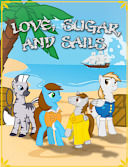
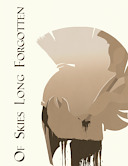
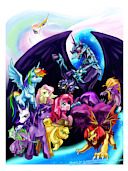

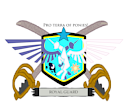
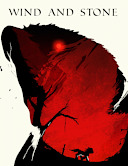
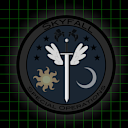

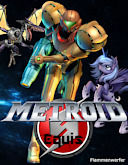

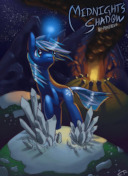

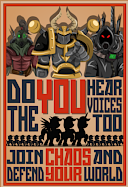

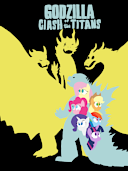


I would just like to say that I would rather enjoy it if you came out with a sequel following Rye, because just like Bujold you have created a character who has alot of potential for further stories.
I must agree with thelastkaos; I would definitely enjoy a sequel based on Rye's adventures after the war as a political ambassador for Equestria, If it's not in the way,um
hopefully sad fluttershy will win over your conscience.
I really encourage you to continue with these characters. They're really appealing and fun and I personally want to spend more time in their world with them. I think the stuff with Inger's father could easily be introduced as the noble now happy to acknowledge his parentage since having such a famous son would likely outweigh the cost of a bastard child. I'd be interested to see how Inger handles it since surely his father won't be a typical snotty noble.. As well I can picture Cranberry going to see the Sleipnord ponies while with foal. That could also potentially help you deal with the potential equality issues though as you mentioned that can be tricky.
Either way I truly adored your fic and I'm sorry I hadn't found it sooner. I wish with all my heart that you'll allow us to visit with these characters again as I feel they surely have more stories to tell.
I bow before you. This is among my favorite stories since i began reading it, around chapter 27 i believe, and I always looked forward to the updates. I think you did a splendid job in presenting the characters as themselves rather then a predetermined evil or good. Naturally we root for one side, but in war both sides believe themselves just. I am honored to have been allowed to know the story of Rye Strudel.
The story is one of my favorites on this website and it really saddens me that it has a low number of likes for such a well written story. Also, to be honest, I actually liked that you kill off Clement instead of the father mainly because Emmet's death would've please most people. It also helps drive the point that, in war, not all of the heroes make it back. I'm on the fence to whether I would like to see a sequel or not mainly because I have it in my head that somehow Rye ends up marrying one of the toughest Nordic mares around.
Poor Rye. Save the world! Become a footnote.
Become a footnote.  Damned racist ponies. They can make peace with the gryphons, but they can't have one of their heros being one o dem leper pegacorns.
Damned racist ponies. They can make peace with the gryphons, but they can't have one of their heros being one o dem leper pegacorns.
Also that Afterword is freaking huge, man! I mean as in longer than most of the chapters! i think length wise it comes in 6th or 7th place out of 67 chapters
If there was one fic I could make everyone read, it would be this one. You really deserve more attention for this masterpiece you've created, and I think more people deserve to read it, as well.
Welp. I definitely am following you. I expect to see more good stuff in the future.
This fic should have a lot more views than it does.
2160902
THEY'RE ALL GONNA LAUGH AT YOU!!!
Your story about Luna's imprisonment was good enough for me to have remembered it (if only vaguely) for all this time since I read it. It was a fine story.
Funny you should mention the Codex Alera, I just finished reading the second book (started the series this monday) and the writing style did remind me of Wings
Be happy, I just put your writing on level with the mighty Jim Butcher
I've always been hesitant for one reason or another to read other pony-fics, but I'm glad to have chosen this one.
Thank you so much for sticking with this, despite the less than stellar initial reception, lol. I'm so very glad I clicked this when I first saw it on EQD just to see what kind of silly alicorn OC you were making, just to be pleasantly surprised at the reality of the character.
More authors should do huge afterword chapters like this, too. I like seeing an author's thoughts on their own story, and mentions about things I didn't catch while reading. I have to ask, was that unicorn messenger Rye saw die at the very beginning of the story somewhere in Twilight's ancestry?
2172829
Yep! She was certainly intended to be. Thanks for sticking with it from the start. Your reaction to the pegacorn concept was an encouraging one, way back last January.
2172839 Well, rotation singular, more like, but still.
Well, rotation singular, more like, but still.
Last January...? Holy crabs, time passes fast. It's hard to believe I've been reading this story for a period of time measurable in rotations of the Earth around the sun.
And going back and reading my first comments on EQD, I just realized. That magic-crazy forest totally never got any sort of explanation. Oh well, I'll just assume it was the site of some ancient primordial battle and a god died there, and is now in some sort of weird eternal state of decay, saturating the land with its divine essence. Works for me.
Oh well, I'll just assume it was the site of some ancient primordial battle and a god died there, and is now in some sort of weird eternal state of decay, saturating the land with its divine essence. Works for me.
Gosh. This was such an incredible, incredible ride. Read it, liked it, and reviewed it, right here.
This, sir, was a truly good job, and you have to be proud of yourself.
2177805
Wow, thank you for the review! I'm glad you enjoyed it.
This is one of the best fanfics that I've read so far. I was hesitant at first to reading it however I soon found myself it reading non stop. Your characters are excellent and I found myself genuinely sad at some points. I look forward to any of your future work, keep the awesomeness coming.
This is the first FIMfic I've ever read, and I still don't know what made me choose this one in particular, I wanted a story to read and your cover (?) caught my eye. Now that I'm through it all I have to say that this is one of the most beautifully crafted stories that I have ever read in my entire life (and I have gone through quite a lot of books). All the personal/moral/whatnot dilemas that you create feels genuine and really stirred a lot of emotions in me, that is what I look for in a book and nailed it in every single chapter. I've tried my luck at writing and I know many of the difficulties that comes with creating a text that is satisfying to look at, but you have done a marvelous work and you have my respect and eternal gratitude for giving us this story. Good luck in the future and I hope that you continue writing, because they way you build a story and its characters is incredible. Thank You!
I had my eye on this story for a while; I knew from the cover there would be plenty of suspenseful cliffhangers (it is an adventure after all!) and I'm extremely bad at waiting. When I saw that you had finished the updates via EQD I was happy that I could finally sink my teeth into it and not have to stop until it was all gone. You did not disappoint
Most stories of the adventuring genre get bogged down in something. More specifically, it could be in describing battles, (as you've stated in the afterword) having an inconstancy of pacing, (Powers of Harmony comes to mind) or just having the characters turn into nothing more than what they bring to the table. (A rogue type character used only for sneaking and deus ex machina escapes with no speaking lines) You overcame of these pitfalls that are so easy to fall into while writing; you managed to keep the pacing at what I'd consider on of the greatest displays of consistency I've had the pleasure to read at. There are few (if not only one) descriptions of battles for the sake of showing that there's action instead of using the aftermath to propel a characters personality forward. (You did an exceptional job with Clement; I think he was the best dynamic character you made from a writing standpoint) And you even somehow made the untested Cranberry have a role besides knowing everything about Sleipnord.
However, your writing didn't simply refuse to fall into certain cliches and monotonous cycles, it actually set new standards for what good adventure writing should be IMO. Windstreaks fall from grace was so subtle that I failed to notice it until after Bergerond (Probably spelled it wrong) died. The only critique I have on your writing of Windstreak was the final scene with her and Wheatie vs. Shrikefeather you focused on what was happening to Wheatie rather than Windstreak. (You probably could've gotten away with splitting the chapter at that moment, coming back in with a Windstreak's full internal conflict choosing vengeance or saving her friend and continued from there) Even characters that I'd predicted to be flat and filler for there roles, Inger and Eberhardt, showed some development. You exceeded my expectations for a real novel; let alone fanfiction for some Technicolored tiny equines.
For Grammar and Language Mechanics I give you 9.5/10; I only spotted 6 or 7 minor errors throughout
For Consistency and pacing a 10/10; A tremendous display of control and even storytelling
For Plot and Characterization you deserve a 10/10; having 2 NON-MAIN CHARACTERs have a shift is incredible. (In Windstreak's case it was 2 separate shifts FFS)
For Description I'd give you a 8.5/10; You said it yourself; there's only so many ways to say that a dude stabbed another dude. The main problem I had was that you stated how cold it was in Sleipnord a lot in a very similar way; metaphors spice that up (Which is what the reader needs after being told they're Freezing! )
)
And Lastly for your Style I'd give you a 9/10. Balancing the stoic and flamboyant natures of some of the characters caused a little issue with the characters dialogue. Eberhardt's exchanges with Cranberry seemed mismatched with the darker themes going on during the voyage. The near-rape scene you had with Inkpot (I know you've stated you're uncomfortable with it too) lost much of your normally sharper and grandeurious way of writing. However, style is extremely hard to grade given that I cannot tell if you're mixing things of different nature for a distinct reason, or if you're just not comfortable writing that style. (If you intended for the rape scene to be like that I'm sorry! )
)
Overall your story is a 47/50; exceptionally high given that Backround Pony had a 47.5 and the Powers of Harmony (as it is now) has a 44 . You made it into my top 5 with this story and gave me the gift of a good read. I hope your future writings can be as good as this one; it'd be my pleasure to read them.
Cheers!
Drunken_Robot
P.S. I'm waiting for you to finish the side story with Rye so I'm not forced to wait for the conclusion to the many cliffhangers you'll leave out there. I know that story will be a good one.
2267578
Thanks for the review! I always appreciate getting feedback.
And it's not just a side story, it's a full-blown sequel! I'm hoping to keep it around 100k but it's starting to look a bit longer from my outline. I may do some shorter vignette pieces with other characters though.
So I actually finished reading this a while ago (as in when the last chapter was posted), and I wasn't rally sure what I should say now that it was over. Still don't really know, but I'll give it a go anyway. I'm not sure when I started to start reading this, but I always read it on Google docs. Somehow, I found out that it was on FIMfiction. I was shocked at how little attention it had. I favorite a lot of stories so that I know when a new chapter is posted, but I only like the ones that I think are the best. Your story has earned every like it has, but deserves much more. I had that same thought at the end of each chapter: 'This story deserves more attention than it has.'
I'm not one of those literary analysts that can decode what a story means, but I know that this did what it set out to do.
It made me feel.
I felt hope leave when the dragons entered the first battle. I was on the edge of my seat when Rye was going through the caves filled with those... things. I was angry at Cranberry when she couldn't keep her hooves to herself, and was horrified when her sister was almost... well.
With all the stories I read, I go in with high expectations. Many of them don't meet them, but this one clearly did.
Finally, I don't seem to remember that note at the end letting us know about the sequel(which I just started). Either way, you may want to consider posing an extra chapter here letting your readers know that Rye's adventure isn't over. Which I am so glad for; he didn't get nearly enough recognition as he deserved.
<3 The Entire Story, kept me hooked the entire time (and all night long almost )
)
lol, who added this to "Straight Shipping"?
2569124 Then fantastic work
2745672 that's correct, but not the point ^^ i'm talking about humans(me :D) eating Horse/Pony meat. and i think the previous comment did too...
This is the second fanfic I ever read. Even now, dozens and dozens of fics and thousands of pages later, (I read a lot) I still consider it to be one of my all time favorites and one of the best action/adventure stories in the fandom, second maybe only to Fallout Equestria. This story is criminally under read and under rated.
This is, next to project horizons, my new favourite fanfic. It pains me to see how few views it has gotten considering its quality and epic fantasy plot, the characters developed believably and were likable (Windstreak in particular was my favourite) and the battle scenes were easy to read and understand (which can be difficult to write at times). I'll be sure to read your other stories
So, I started reading this story a year or so ago, read about a third of it, and forgot about it for a few months. By then, I needed a rereading, so put it off. A few days ago, I started that rereading, and have now finished and feel the need to share a few thoughts.
First, some thoughts on the afterword. The feeling kept growing throughout the story that the author was both quite literate, and literate along very similar lines to my own tastes - this was proven when you started dropping all of those references. In particular, I am pleased to note the reference to the Codex Alera series, as those books had the almost exact same feel to them as this story. I also enjoyed seeing Consider Phlebas in there; I'm currently reading it, and had the exact same problems with the exact scene you called out (Banks seems to have had problems with really silly, clumsy, and over the top social commentary mixed in with his "shocking" scenes; Use of Weapons and Wasp Factory's endings in particular felt really poor). In addition, pointing out the flimsy logic behind the gryphons relying on ground troops was something I was going to bring up here; I glad to see it addressed.
Now, on to specific thoughts on the story... I realize I can't think of any. I have almost nothing by way of nitpicks to make; this is an absurdly well crafted story. Most of the significant characters were very well fleshed out (a little more from the nordponies wouldn't have been amiss), and none of the antagonist characters felt flat and boring like they so often do in epic fantasy. Pacing was well done, and the battles didn't feel like dragging spectacles (again, like they usually do). I'm going to weigh in on the side of really appreciating Rye's fading into obscurity. If he'd have become accepted and loved and honoured by everyone, it would have really weakened all the deconstruction that had went into his character. Plus, the distinction between doing great deeds and being remembered for doing great deeds is a big one (anyone who has played Final Fantasy Tactics should know what I'm going for, here, and understand why the author played things as he did).
Overall, I consider this to be one of the best examples of young adult epic fantasy I've ever read, right up there with any of the published authors in the field.
I wish I could've been here from the beginning. I've had this on my read later list ever since it first came to fimfiction, and I only picked it up because a friend of mine kept pestering me to read it.
I wish I'd listened to him sooner. This was, without a doubt, one of the grandest stories I have ever read. I am still reeling from what you've done here... By no means was it perfect, but I think that's part of the reason that I enjoyed it so much. This was a story about flawed characters who were real, who grabbed your heart by its strings and never let go. There was so much here, I don't know if I'll ever really be able to think the same way again.
So, I know I'm horribly late to the party, but... thank you.
This story was an excellent read. The characters were diverse but believeable, and it was great to see them change throughout the story, especially Windstreak and Clement. The battles were written perfectly and left me on the edge of my seat. I like how you followed Shrikefeather, showing us his character and his army's advancements without telling the full story like you did with the other perspectives. And yes, you did achieve your goal. You were able to grab ahold of my emotions and manage to not throw them around. This story may be a ghost town right now, but I hope that more people like me will stumble upon this gem.
3929762
Toldja
Well I thoroughly enjoyed this. I found it while looking for a nice long adventure story, read up to chapter 22, closed the tab completely on accident and proceeded to forget about it till thankfully 3974413 recommended it to me as a story that truly needs more attention.
This was a masterpiece, it's for work like this that I stay in the fandom.
Thank you for writing this and thank you to Cerulean Voice for getting me to finish reading this.
3929762 You're everywhere.
Oh. My. God. This is by far the best story I have ever read. Holy crap! It is amazing.
Fucking this story. Jesus god. You're up there, dude. Ascended past the rabble of common stories and into the halls of legends. Truly, anything that can be mentioned in /mlp/ in a positive light and not start a flamewar of sorts is something worth treasuring. I'll always have a soft spot for FO:E, being the first "perennial epic" of this stupid fandom, but, truly, this fic has met that par, if not surpassed it. Fantastic worldbuilding, realistic scenario, 3D characters, and a skill in pacing that I would murder an orphanage for.
0/10: it was okay
4185716 The fic pretty damn good, but I wouldn't say it's legendary like Fo:E. That motherfucker has, like, over a few thousand likes. And other fics like My Little Dashie and Cupcakes (Both I think are overrated, IMO).
4225818
This is probably the most helpful link I could provide. That second sentence usually applies hard to alicorn fan characters, them being an alicorn being evidence thereof. Almost every time someone creates an alicorn character, their reason for being an alicorn is non-existent or just outright stupid and self-serving, the real reason being "because its cool !!:D". So at this point, any time people see an alicorn character in a fanfic right off the bat, most just assume Mary Sue (and therefor bad writing) and move along without giving it a chance.
Hah, I knew it! This story reminded me alot of Lord Of The Rings in some places, glad to see it confirmed.
Absolutely captivating, should have more likes than it does.
4615410
Romance can happen in any story, but it's whether or not the story is actually based on said romance. The story was from Rye's point of view, but he wasn't paired with anybody.
Just letting ya know
This is a great ending song.
When I was reading this, I wondered why people always said Winstreak had a fiery mane. This was because on the cover art, I thought Cranberry was supposed to be Windstreak. HOW COULD I BE SUCH AN IDIOT
I loved this story! Enough said.
4869427
I like long, analytic comments; no worries there.
As for the map, my method for this one was: drew up map on notebook paper (of all things), scanned it, did the outlines and city stars with Adobe Illustrator, then ported them to photoshop for the background texture, color, and labels. The compass was also done in illustrator, it has a handy star-making tool that can render those long, thin cardinal points.
4869936
Ah, it's one of those custom, self-made jobs. I've tried that and usually get crummy results. Oh well, I'll think of something. I'm going to need a map sooner or later, my worlds are growing to be a bit too large without one.
4870186
Strudel's her married name. She's still known as Windstreak Firemane to most.
In retrospect, it is a rather weak plot point. One of the many pitfalls of a first novel, alas.
4870261
Aaaaah. See, since Equestria always seemed to be a female-dominant society, I've always assumed that family names pass through the female line in Equestria. I keep neglecting that most people don't see it that way.
My bad.
4870305
I actually had some explanation for this that I never found a way to naturally integrate into the text. Way, way back when the ponies were still small tribal groups wandering around (think barely past a paleolithic stage), they were structured like wild horse herds, ie one male and a lot of females. To organize themselves and distinguish their social groups, every female would take the lone stallion's name as a second name, which after several thousand years evolved into using the male surname after marriage.
4870373
Huh. Well, that's certainly befitting if one takes that kind of cultural background into consideration. But without that information in the text there is, of course, no way to know it. Still, interesting.